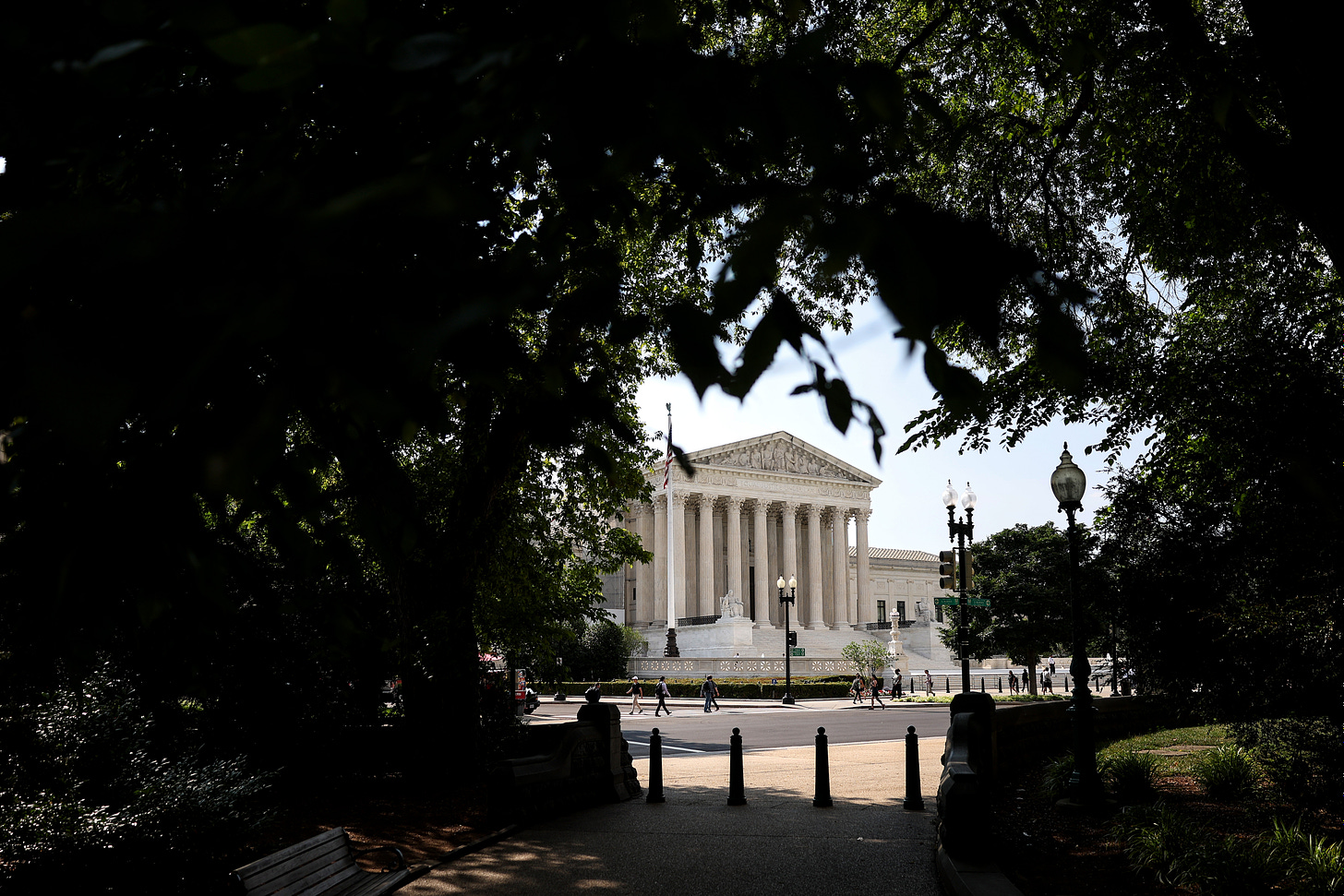Supreme Court Smacks Down Radical ‘Independent State Legislature Theory’
The GOP-pushed doctrine would have allowed state legislatures to ignore courts and even state constitutions in rewriting election law.

WHEN THE SUPREME COURT HANDED DOWN its decision on Tuesday in Moore v. Harper, the collective exhale among experts in voting rights and constitutional law was almost palpable. The case involved the so-called “independent state legislature theory”—a cynical maneuver by Republican lawmakers and lawyers to essentially immunize state legislatures from any review whatsoever for passing anti-voting legislation, however draconian and however violative of state law. The proposed doctrine gained steam in connection with the sixty-plus Big Lie lawsuits filed in the wake of the November 2020 election. The fact that the Court agreed to entertain the theory in the first instance by granting certiorari in this case was alarming. The fact that Chief Justice Roberts in his majority opinion resoundingly put it to rest once and for all—despite the availability of a ready off-ramp—is very good news.
To understand the importance of Moore, it’s important to unpack some fundamentals. The case involved a challenge to the creation of North Carolina’s fourteen congressional districts. Following the 2020 census, which showed a population increase of nearly one million people in the state, the Republican-led North Carolina General Assembly reconfigured the electoral maps to add a new House seat. A group of voters and voting-rights interest groups sued in state court, arguing that the new maps (both for federal and state legislative districts) violated the state’s constitution.
The ability to sue over gerrymandered maps in state court under state law is critically important because, in 2019, the U.S. Supreme Court in Rucho v. Common Cause closed the federal courthouse doors to any federal challenges to partisan gerrymandering. Although the Court has banned redistricting based on race, Rucho greenlighted partisan, or party-based, gerrymandering—which is the self-serving practice of carving up districts to effectively guarantee dominance by the political party that controls the state legislature in any given cycle, regardless of the collective views of the voting public. After Rucho, the only way to legally challenge partisan gerrymandering was at the state level under state law.
A three-judge panel of state judges held a trial on the plaintiffs’ challenge to the North Carolina maps, at which expert testimony and other evidence was presented to show that they illegally favored Republican candidates. The trial court found for the plaintiffs, concluding that the congressional redistricting map was “a partisan outlier intentionally and carefully designed to maximize Republican advantage in North Carolina’s Congressional delegation.” But it nonetheless refused to do anything about it, concluding that the issues “amounted to political questions”—meaning that they were questions for lawmakers, not judges, to settle. The North Carolina Supreme Court reversed, holding that state courts could review partisan gerrymandering after Rucho, and struck the maps down. The North Carolina General Assembly then adopted a remedial plan, which the trial court rejected, instead imposing maps developed by so-called “special masters” appointed by the court.
Meanwhile, North Carolina held a midterm election in November 2022. On the ballot were two seats on the North Carolina Supreme Court, previously held by Democrats. Both went to Republicans, flipping to the GOP the court’s 5-2 majority. The newly reconfigured court then overruled itself and dismissed the plaintiffs’ claims, inviting the general assembly to enact new maps.
With all that laid out, we can now circle back to the independent state legislature theory.
In arguing for review by the U.S. Supreme Court, the GOP-controlled general assembly asserted that the state court was forbidden by the U.S. Constitution from considering whether the maps violated the North Carolina constitution. The argument arose from a strained reading of the U.S. Constitution’s Elections Clause, which provides:
The Times, Places and Manner of holding Elections for Senators and Representatives, shall be prescribed in each State by the Legislature thereof; but the Congress may at any time by Law make or alter such Regulations, except as to the Places of chusing Senators. [Emphasis added.]
The theory went like this: By using the terms “by the Legislature,” the Constitution’s Framers meant to make state legislators the ultimate deciders of all things related to federal elections, unless Congress steps in. The theory is radical not only as a matter of common sense but also in light of core separation-of-powers principles, because it would have lodged unchecked power over federal elections in a dominant political party of elected state representatives, enabling them to override even their own state constitutions willy-nilly, and leaving the gerrymandered ballot box as the only recourse for voters wishing to ensure that lawmakers complied with the law.
Chief Justice Roberts, in no uncertain terms, killed the theory: “The Elections Clause does not insulate state legislatures from the ordinary exercise of state judicial review.” Period.
One indicator of the cynical hypocrisy of the independent state legislature theory can be found in this paradox: It is North Carolina’s state constitution that creates the North Carolina General Assembly in the first place, so if the theory were true, then there would be no mechanism under our system of laws to ensure that the general assembly complied with the terms of the constitution that created it. Retorted Roberts, quoting a case dating back to 1795:
What are Legislatures? Creatures of the Constitution; they owe their existence to the Constitution: they derive their powers from the Constitution: It is their commission; and, therefore, all their acts must be conformable to it, or else they will be void.
Roberts could have easily sidestepped any ruling on the legitimacy of the independent state legislature theory by rationalizing that the 2022 election mooted out the entire case because the original map was no longer in play. Justice Clarence Thomas, in a dissenting opinion joined by Justices Neil Gorsuch and Samuel Alito (in part), made precisely that argument, declaring that “the question is indisputably moot.” Had that view gained a majority, the menace of the independent state legislature theory would have lingered for the 2024 presidential and congressional races, making its way into lawsuit after lawsuit on the hope that the conservatives on the Court would eventually hand GOP state legislators the golden keys to federal elections forever, absent an amendment to the Elections Clause itself.
Moore is the third in a series of surprisingly moderate rulings this term, following Allen v. Milligan, a 5-4 decision directing Alabama to redraw its congressional map to add a second majority-black district, and United States v. Texas, in which the Court dismissed a case brought by states seeking to second-guess President Biden’s immigration policy. The Court on Tuesday also issued its decision in Mallory v. Norfolk Southern R. Co., upholding a longstanding Pennsylvania law that requires out-of-state companies that register to do business in the Commonwealth to agree that they can be sued for anything in that state—an expansive approach to jurisdiction that is not exactly pro-corporation. That ruling, too, came as a surprise, given the deeply conservative leanings of the modern court. Justice Amy Coney Barrett dissented, joined by Chief Justice Roberts and Justices Elena Kagan and Brett Kavanaugh.
As some observers have speculated, this seemingly moderate trend could certainly be just the calm before the storm. After all, the Court’s decisions in two other big cases this term—involving the fate of affirmative action and whether business owners can discriminate against LGBTQ+ customers in the name of free speech—have yet to be announced. But it could also have something to do with the firestorm of conflict-of-interest scrutiny that individual justices have brought on the institution as of late, starting with the Clarence Thomas ProPublica revelations and continuing right through new allegations about Alito and his family this week.
For now at least, we can linger on the bright side of things, knowing that laws governing congressional elections must, at a minimum, abide by the terms of state constitutions.





